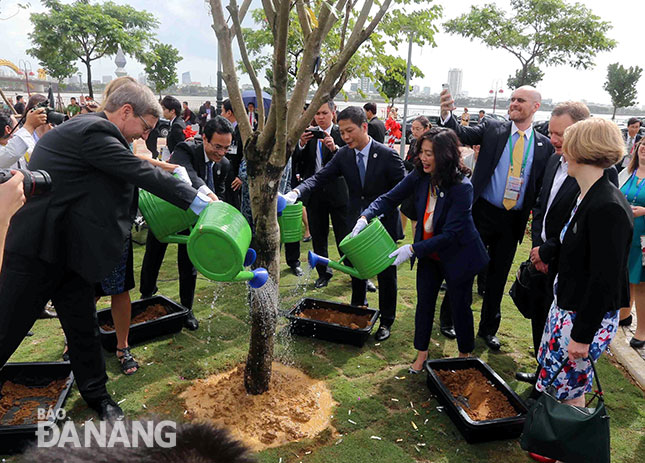Expansion of APEC Park suggested to make it more attractive
Opened last November, a park alongside the western bank of the Han River in Da Nang, featuring the symbols of the Asia-Pacific Economic Cooperation (APEC) member economies, has emerged as a wonderful cultural landmark in the heart of the city.
 |
| The APEC delegates together planting a tree during their joint visit to the park last November (Photo: DNO/ Hoang Hiep) |
Hailing the significance of the APEC Park, both local inhabitants and visitors highlighted a must-do to expand this venue to create more green spaces for the city centre, and allow diplomatic events and festivals to be held here as well.
The park was build on a 3.047m2 triangular-shaped vacant land lot at the intersection area of 2 September street and Bach Dang extended street, near the western end of the Rong (Dragon) Bridge, in Hai Chau District’s Binh Hien Ward.
The displayed works of arts, created by APEC’s member economies, showcase the region’s distinctive cultures, and highlight the overall theme of APEC 2017: ‘Creating New Dynamism, Fostering a Shared Future’. The venue is truly a symbol of solidarity and cooperation in the APEC community where cultural diversity has been promoted.
Over recent months, the park has become one of the popular attractions in Da Nang. This venue is very attractive to those who are keen on exploring local landmarks and taking souvenir photos with the eye-catching landscapes.
 |
| The Indonesia delegates posing for a souvenir photo at the park (Photo: DNO/ Hoang Hiep) |
Many local residents proposed that the APEC Park should be expanded into the southern side of the city, and more interestingly as it will stretch to the western end of the Tran Thi Ly Bridge.
A local man residing near the park said he fully concurs with the expansion of the park into the southern side of the city to create more spaces featuring cultural, historical and arts values of APEC’s member economies.
Another resident said, in the US and Western countries, it is common to see small strips of land stretching along rivers where people can take leisurely strolls to enjoy the fresh air, do physical exercise or to explore the scenic beauty.
Mr Phan Dinh Duc, the Vice Director of the municipal Management Board of Agriculture and Rural Development Projects, which is in charge of managing the park, remarked, “It’s necessary to expand the APEC Park in order to open more spaces for advertising the characteristics of APEC’s member economies to both locals and visitors”.
Many local architects also highly hailed the expansion of the Park for the sake of the progress of such a tourism city.
During his working session with representatives from the municipal Department of Culture and Sports, municipal People’s Committee Huynh Duc Tho asked this agency to consider creating more cultural spaces, maybe, an area exclusively for displaying various types of stunning flowers, to attract a great deal of attention from tourists.
Like local residents, many visitors coming to the city also voiced their support for the expansion of the riverside park.
South Korean visitor Lee Seung Won said the existing sculpture park is quite small. Therefore, it is a very good idea to create more tree planting areas, and put sets of benches in the park where people can sit to relax or sightsee.
Sharing a similar point of view, Ms Ayame Moku from Japan, said she hopes that Da Nang’s future image will show off more stunning bridges, modern buildings, and especially trees, in the heart of the city.